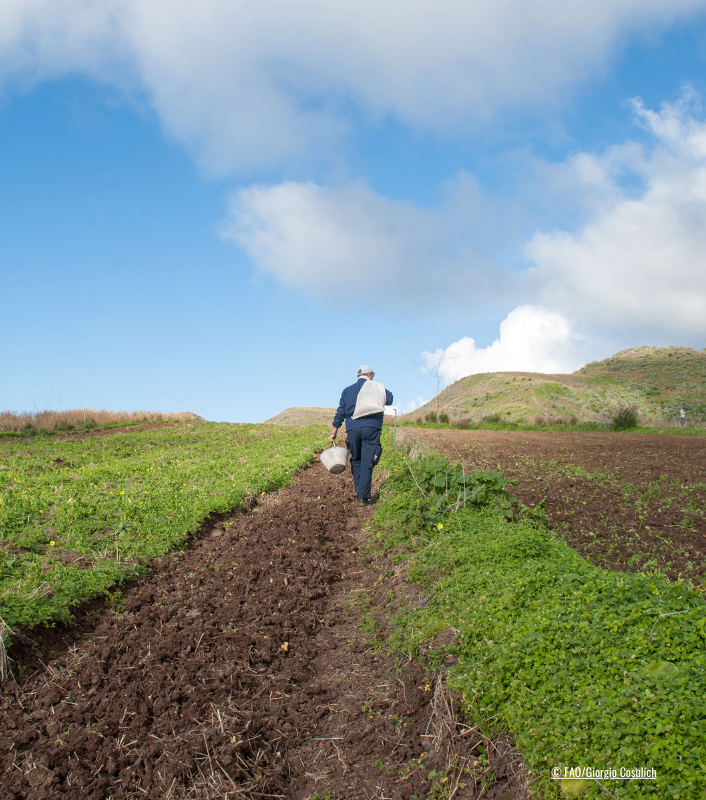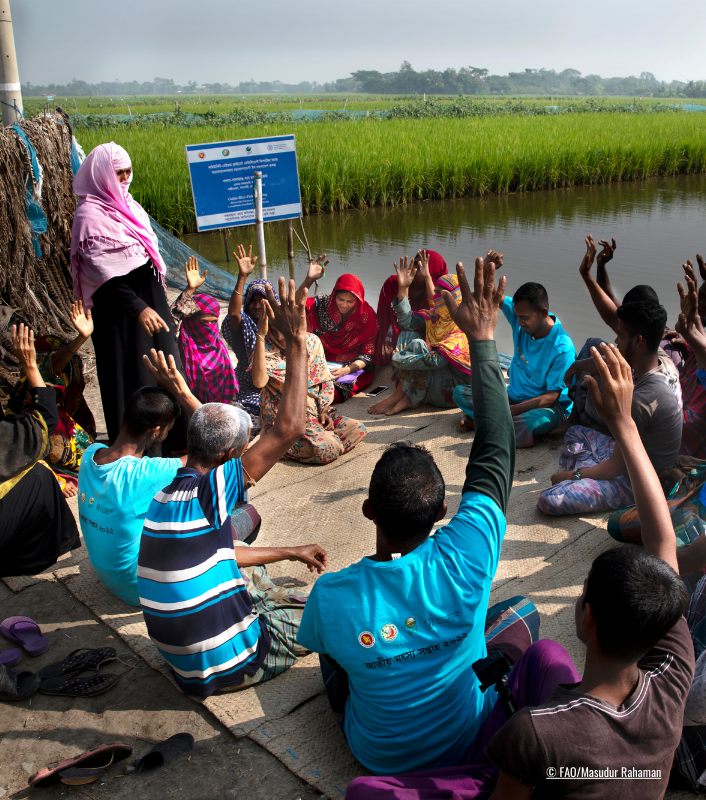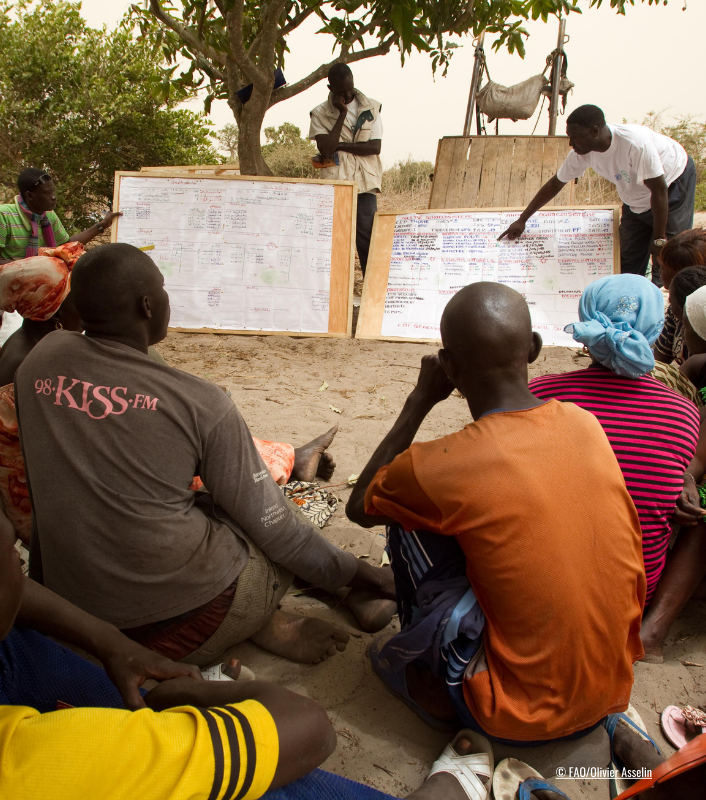GLOBAL ASSISTANCE
Advance equitable livelihoods and decent work and empowered communities
Agroecology Coalition
Type of Assistance
- Strategies and policies formulation: support the formulation or review of national food system related strategies, policies and legal frameworks. Normative guidance: e.g. development or review of guidelines and how to use them at country level
- Analytics: assessments, analysis, data collection, evidence generation and monitoring, solution scanning and modeling. Monitoring and Evaluation support: identifying meaningful progress indicators, developing results frameworks and M&E plans
Coverage: Global
Summary of Assistance:
The purpose of the Coalition is to accelerate the transformation of food systems through agroecology, guided by the 13 principles of agroecology defined by the High Level Panel of Experts (HLPE) of the Committee on World Food Security (CFS) that are aligned with the 10 Elements of Agroecology adopted by the 197 FAO Members in December 2019.
The Agroecology Coalition has 3 workstreams:
1) Facilitating the co-creation and sharing of knowledge
- Engaging in participatory, transdisciplinary research, inter-cultural innovation and co-design with stakeholders
- Facilitating capacity building, including peer-to-peer learning between countries and between organizations
- Showcasing best-practice in agroecology and holistic monitoring and evaluation frameworks
- Contributing to co-learning between scientists, policy makers and civil society actors
- Fostering the development of agroecology education programmes
2) Promoting increased investments in agroecology
- Catalyzing coordinated investments for collective action (e.g., via donor convenings)
- Promoting adequate support for agroecology movements and networks to advance agroecology
- Developing an online tool to track investments in agroecology and to assess to what degree initiatives are contributing to agroecological transformation measured against the 13 principles of agroecology (available online in September 2023)
3) Seeking political engagement and increased commitment to agroecological transformation
- Promoting the adoption of policies and legislation supportive of agroecological transformation.
- Mainstreaming of agroecology in international organizations and other international fora (e.g, Rio Conventions)
- Promoting the adoption of agroecology through large-scale landscape initiatives
- Partnering with biodiversity, climate, water, sustainable landscape actors to promote the agroecological transformation
Focal Points and Contact: Oliver Oliveros, [email protected]


International Coalition for Territorial Food Systems Governance
Type of Assistance
- Strategies and policies formulation: support the formulation or review of national food system related strategies, policies and legal frameworks. Normative guidance: e.g. development or review of guidelines and how to use them at country level
- Analytics: assessments, analysis, data collection, evidence generation and monitoring, solution scanning and modeling. Monitoring and Evaluation support: identifying meaningful progress indicators, developing results frameworks and M&E plans
Coverage: Global
Summary of Assistance:
Territorial Food Systems Governance Frameworks Factsheets
The International Coalition for Territorial Food Systems Governance will implement a systematization and evaluation of the existing food systems governance frameworks in the Coalition’s member states in partnership with FAO and UNEP and other relevant organizations. This methodology will allow the analysis of the existing government-led food governance mechanisms and to understand their design, functioning, participation, performance, and impact at a national level.
Guidelines for Participatory Territorial Food Systems Diagnosis
The Coalition will publish guidelines to conduct participatory territorial food systems diagnosis. The assessment will identify key bottlenecks to transform territorial food systems governance, identifying the major priorities at different spatial levels, in order to overcome the existing constraints.
The Coalition will pilot the Guidelines for Participatory Territorial Food Systems Diagnosis in 6 voluntary Member States. The diagnosis will generate data to inform multi-level territorial food systems governance.
Knowledge Exchanges Program on Territorial Food Systems Governance
The coalition will facilitate its members to share best-practices and build knowledge to strengthen government-led, multi-level, multi-sectoral and multi-stakeholder food systems governance mechanisms.
Focal Point and Contact: Mr. Manuel Clarote Lapào, [email protected]
Pan African Network for Economic Analysis of Policies (PANAP) of the European Commission Joint Research Center
Type of Assistance
- Strategies and policies formulation: support the formulation or review of national food system related strategies, policies and legal frameworks. Normative guidance: e.g. development or review of guidelines and how to use them at country level
- Analytics: assessments, analysis, data collection, evidence generation and monitoring, solution scanning and modeling. Monitoring and Evaluation support: identifying meaningful progress indicators, developing results frameworks and M&E plans
Coverage: Africa
Summary of Assistance:
The Pan-African Network for Economic Analysis of Policies (PANAP) brings together academic, research and institutional partners that develop research on agro-economics and policy issues. It was established in 2019 under the aegis of the African Union (AU) - European Union (EU) partnership.
PANAP supports continental, regional and national policymakers in Africa in designing, assessing ex-ante and evaluating ex-post the impacts of agricultural policies and strategy formulations. PANAP functions as the guiding agent in elaborating policy impact modeling tools by strengthening the liaison between researchers, scientists and policymakers in Africa. Additionally, PANAP stimulates these stakeholders' cooperation on policy priorities that reinforce the stability and enhance the development of African agriculture and food sectors. Users receive training in using the tools.
PANAP promotes scientific methodology to develop and implement policies at two levels:
- Farm level models
- Macroeconomic models
Focal Point and Contact: Pascal Tillie, [email protected]

